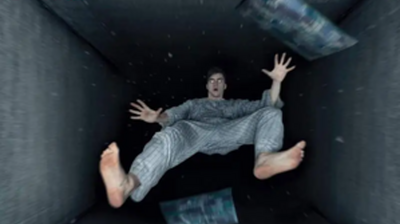Entertainment
AMERICAN THEATRE | ChicagoŌĆÖs Bodily Theater Pageant: Shifting in Many Senses
“Maybe, Maybe… Quiz├Īs,” by Chula, The Clown (Mexico), introduced by BorderLight Theatre Pageant as a part of the 2024 Bodily Theater Pageant Chicago.
A child and a theatre pageant: Over a decade in the past, a beloved Chicago couple found they had been pregnant with each. Their youngsters now run about wild, artistic, free. The annual Bodily Theater Pageant Chicago proved a preferred tween this yr, boasting eight totally different exhibits, 5 workshops, and three digital occasions throughout the month of July, and attracting over 2,000 viewers contributors. However you might be shocked to study that this landmark celebration of storytelling was conceived on an unassuming flight of fancy.

Co-founders and creative administrators Alice da Cunha and Marc Frost first met doing bodily theatre within the U.Ok., they usually proceed to attract lifelong inspiration from sweeping curations just like the London Mime Pageant. ŌĆ£After we got here to Chicago, Marc and I at all times mentioned that once we retired, we might begin a bodily theatre pageant,ŌĆØ mentioned da Cunha. They didnŌĆÖt have to attend that lengthy, receiving a curatorial grant of $3,000 from Hyperlinks Corridor simply two years into their Chicago residenceŌĆöand three trimesters into the gestation of their firstborn, Benjamin.
If anybody can deal with such a large endeavor, itŌĆÖs these two sensible artistic leaders. Da Cunha and Frost have change into native theatre celebrities, identified for his or her heat effervescence and sharp crucial eye for motion. Audiences crowd round them at every present for a dialog or a Carioca ŌĆ£hi thereŌĆØ (two kisses on the cheek) as the 2 bustle about pageant duties. Their complete lives appear to have ready them for these moments, as they change seamlessly between neighborhood constructing and firm administration, diplomacy and artwork, coronary heart and thoughts, one language and one other. They prolong many bridges.
Annually itŌĆÖs shifting to see how they type a border-defying household. Da CunhaŌĆÖs roots in Portugal and Brazil and FrostŌĆÖs upbringing in Chicago assist them create Windy Metropolis areas that really feel like residence to artists from all around the world. This yrŌĆÖs lineup featured much-anticipated spectacles which had garnered excessive renown of their residence nations and accolades throughout worldwide festivals. These included Clayton NascimentoŌĆÖs grounded and transformative Macacos, from my native Brazil: Chula the ClownŌĆÖs hilarious and heartbreaking Maybe, MaybeŌĆ” Quiz├Īs from M├®xico; and an array of multigenerational choices like cinematic The Man Who Thought He Knew Too A lot from Voloz Collective (France/U.Ok.). From Chicago artists there was Scratch Evening, that includes works-in-process; Theatre YŌĆÖs soul-stirring Little Carl; and an out of doors Millennium Park extravaganza with circus and magician performers.┬Ā

All of the items this yr delved into some factor of play, metatheatricality, and silent imagery. Many had been one-person exhibits; some had been fully nonverbal. All match da Cunha and FrostŌĆÖs expansive definition of bodily theatre: ŌĆ£For those who shut your eyes, you wouldnŌĆÖt get not less than 50-90 % of the storytelling.ŌĆØ Our bodies in house morph into something and every part: A babyŌĆÖs battle to placed on a jacket transforms them right into a rhinoceros within the pleasant DonŌĆÖt Make Me Get Dressed (by BostonŌĆÖs The Gottabees). In Macacos, a Black Brazilian man realizes the stage is an area to dream and resolves to change into a jazz diva, till historical past bursts on the seams and floods in additional sobering anecdotes. And in The Man Who ThoughtŌĆ”, our bodies flip into partitions, bullets, horses, and spilled espresso, within the model of French motion artist Jacques Lecoq.
American performing arts typically really feel siloed. Genres like theatre, standup, circus, and clown self-segregate, and itŌĆÖs not typically you see an organization deeply combine these approaches and communities. This pageant proves the worth of intertwining worldwide efficiency pedagogies. I felt the air shift with risk every second a performer broke the fourth wall, shifted style halfway by means of a present, ventured into self-referential territory, or pulled up viewers members. Talking with patrons, I realized that many look ahead to the Bodily Theater Pageant annually due to this risk-taking innovation, which has change into more and more uncommon in a risk-averse American theatre panorama. IndividualsŌĆÖs pleasure across the worldwide exhibits ought to be a lesson to Chicago, and extra broadly the U.S., to proceed branching out from standard Western storytelling.

Take Maybe, MaybeŌĆ”Quiz├Īs, for example. This nonverbal one-woman present, which depends upon viewers participation, incorporates a level of fourth-wall-breaking and engagement that’s nonetheless all too uncommon in American theatre, and was executed impeccably in pageant performances.
Wearing a marriage robe, Chula the Clown begins out seated, penning love notes and romantic goals on sheets of paperŌĆöthen crumples them up. Her ŌĆ£masksŌĆØŌĆöa painted white face with arched foreheadŌĆölocates itself between the standard 18th-century clown look and the 2010s boy forehead make-up obsession. Hair sprouts from her head like an untamed marriage ceremony bouquet, shifting along with her as she jolts her head to note the viewers. She searches for a groom within the viewers. Purses her heart-shaped lips and heaves a wordless sigh. MuchachaŌĆÖs unimpressed.┬Ā
Gaby Mu├▒oz, the particular person behind the clown, has taken this specific piece world wide for 14 years, and has a number of different exhibits underneath her belt as Chula, who she describes as an extension of herself. Maybe, MaybeŌĆ” Quiz├Īs has a heartwrenching ending you donŌĆÖt see coming: As viewers contributors return to their seats, the protagonist realizes the extent of her loneliness, and, as Mu├▒oz put it, her ŌĆ£absence of self-love.ŌĆØ Mu├▒oz based mostly this devastation on her personal expertise of separation from a longtime companion with whom she lived in London and Montreal. When she returned to Mexico Metropolis heartbroken, she didnŌĆÖt know many individuals and determined the viewers would change into her playmates. ŌĆ£Persons are shocked with how a lot they will take part,ŌĆØ Mu├▒oz mentioned. ŌĆ£Audiences who donŌĆÖt usually do theatre change into part of it. ItŌĆÖs weak for me like it’s for them, as a result of I donŌĆÖt know what is going to occurŌĆöI’m not completely in management.ŌĆØ
She mentioned sheŌĆÖs seen all of it: At one efficiency some time again, a girl protested when Mu├▒oz chosen her boyfriend because the groom. However the ending is at all times the identical, she mentioned: We see the beloved protagonist restart the cycle of trying to find love from the skin, by no means from inside.
ŌĆ£The piece goals to lighten the theme, but it surelyŌĆÖs surreal how resonant it staysŌĆölooking for your energy with another person, when really you will need to discover it inside your self,ŌĆØ mentioned Mu├▒oz. ŌĆ£ItŌĆÖs been a type of remedy to me. I’m a mirror to so many different tales like mine. I discover neighborhood. I do know I can really feel deeply in silence, and nonetheless folks can perceive my ache.ŌĆØ┬Ā

That balancing act between pleasure and ache additionally triumphed in Clayton NascimentoŌĆÖs highly effective Macacos. IŌĆÖd lengthy awaited this worldwide sensation; a number of household mates in Rio de Janeiro had already seen the present, which has even impacted Brazilian justice and schooling. NascimentoŌĆÖs central conceit, he mentioned, is that ŌĆ£theatre is an area to dream,ŌĆØ and he makes full use of its potentialities, taking us by means of an embodied historical past crash course in Brazilian racism, current murders of Black boys, and his personal joyous goals for extra expansive and free residing.
He begins the present in Brazilian Portuguese, with subtitles projected, contorting his physique to depict white folks hurling racist slurs, morphing right into a Black baby enjoying with a toy automotive, and relishing within the ŌĆ£Single WomenŌĆØ dance to emphasise Black pleasure. His physique feels as poetic as his language, and watching him, I felt I used to be experiencing the style of choreopoem afresh. A number of minutes in, he stopped to deal with us in English, asking audiences members to share ChicagoŌĆÖs historical past of anti-Blackness.
At every place he excursions, Nascimento modifies the present to go well with that metropolis, throwing in references and asking the viewers to share their metropolisŌĆÖs realities. In Chicago the play ran 90 minutes, however in Brazil it typically hits a sweeping three-hour mark, filled with native references and a courageous grappling collectively. This model for the U.S. goals to bridge the specificity of Black Brazilian expertise with what worldwide audiences could comprehend, providing extra recognizable cultural touchstones, like novelist Machado de Assis, plus context in regards to the U.S.ŌĆÖs personal complicity in Brazilian oppression.
Past NascimentoŌĆÖs tireless bodily prowess and agile coMMAnd of type, seamlessly shifting us by means of totally different theatrical approaches, Macacos delivers its message after which some. Usually you mayŌĆÖt measure theatreŌĆÖs impression on society, the way in which it shapes hearts and minds in Mysterious and intangible methods. However Macacos has introduced forth real-world justice: After one present in Rio, a lawyer approached him to reopen the case that’s central to the present, wherein police murdered 10-year-old Eduardo de Jesus Ferreira by his residence. Now public faculties in S├Żo Paulo plan to show his script, aiming to fill a spot in schooling relating to BrazilŌĆÖs historical past of colonial violence.
Because the one-man present excursions the world, Nascimento typically brings alongside EduardoŌĆÖs mom, Terezinha. ŌĆ£The folks have opened their arms to her,ŌĆØ he mentioned. ŌĆ£Have a look at what the theatre was able to.ŌĆØ She wasnŌĆÖt in a position to come to Chicago for the Bodily Theater Pageant, however did present a letter, addressed to her son, whom Nascimento embodied.
A highlight of mourning focuses Nascimento, whose eyes fill with the tears of saudade. He speaks her phrases: ŌĆ£Clayton advised me the stage was an area to dream. So IŌĆÖm going to dream with you, my son.ŌĆØ┬Ā

Macacos will subsequent journey to Russia. I change into misty-eyed considering of all of the locations the Bodily Theater Pageant artists see, all the teachings they carry, all of the tales they change, all of the folks they contact. Nascimento expressed his pleasure about breaking the fourth wall, craving to dream along with folks from throughout. Brazil poses its personal super challenges in conversations about race, and if NascimentoŌĆÖs play might impression folksŌĆÖs lives there, effectivelyŌĆöI can’t deny that something is feasible. Listening to tales like NascimentoŌĆÖs places the world in context: Theatre has treaded upon dreamlike surfaces. It is just logical to count on extra transformation to come back from cultural exchanges, greater than we might dare think about now.
Mentioned Nascimento, ŌĆ£TerezinhaŌĆÖs voice within the play stands in for a lot of moms who misplaced their kids to violence. She turns into like all of the moms on this planet. And each time this play occurs, this mom can converse along with her baby. I’ve seen Terezinha alongside the years. And with every efficiency the play has allowed her coronary heart to seek out extra hope and see the world. The message I need to give folks is: Dream.ŌĆØ
Even at workshops it was clear that dreaming on the Bodily Theatre Pageant means an incredible deal to Chicago residents past your common theatre artist. In a workshop known as ŌĆ£The Clown and the Silence,ŌĆØ led by Gaby Mu├▒oz, one participant mentioned she didnŌĆÖt have a background in theatre in any respect. What introduced her there? ŌĆ£A retired lawyer wants lots of clown,ŌĆØ she mentioned with a laughing sigh.
As Mu├▒oz put it, alternatives to play can help you ŌĆ£viajar sin viajar.ŌĆØ Work throughout the pageant transcends borders and ignites the human spirit, typically with out language, at all times bodily clear, and ever genre-bending. ŌĆ£I feel lots of people donŌĆÖt know of the choice to make theatre that manner,ŌĆØ mentioned Alice da Cunha.
She and Frost know theyŌĆÖve carried out it once more once they sit behind a theatre and take heed to the viewers. ŌĆ£ThatŌĆÖs a very powerful half,ŌĆØ mentioned Frost. ŌĆ£Listening to the viewers.ŌĆØ
So I let the laughter and cries wash over me. The chatter within the lobbies invited me right into a form of household. Attendees whoŌĆÖve been with the pageant from day one combined with those that had simply fallen in love that day. Children laughed with grandparents. Strangers talking totally different languages felt acquainted to at least one one other as a result of theyŌĆÖd skilled feelings by means of performs collectively, of their our bodies. This sticky Chicago July, the globe appeared to maneuver only a bit nearer collectively.
Gabriela Furtado Coutinho (she/her) is American TheatreŌĆÖs Chicago affiliate editor.
Associated
-

 Entertainment5h ago
Entertainment5h agoBeyonce to Headline Halftime Show During NFL Christmas Game
-

 Entertainment7h ago
Entertainment7h agoDid You Correctly Answer This Poughkeepsie Related Jeopardy Question?
-

 Entertainment11h ago
Entertainment11h agoWhat to Know About Denzel WashingtonŌĆÖs Gladiator II Character
-

 Entertainment12h ago
Entertainment12h agoChanges Made in New York to ŌĆ£Men WorkingŌĆØ Construction Signs
-

 Entertainment21h ago
Entertainment21h agoRemembering Song Jae-rim: A Look at His Best Movies and K-Drama Performances
-

 Entertainment1d ago
Entertainment1d agoAmerica On CoffeeWeŌĆÖre simply inviting you to take a timeout into the rhythmic ambiance of our breakfast, brunch and/or espresso alternatives. WeŌĆÖre pleased everytime you cease by.SELF CONTROL
-

 Entertainment1d ago
Entertainment1d agoOrange County Choppers Is Ready For Its Big Comeback
-

 Entertainment1d ago
Entertainment1d agoThe Real Story of Geta and Caracalla, the Roman Brother Emperors in Gladiator II























